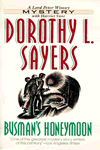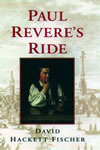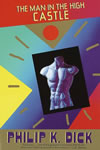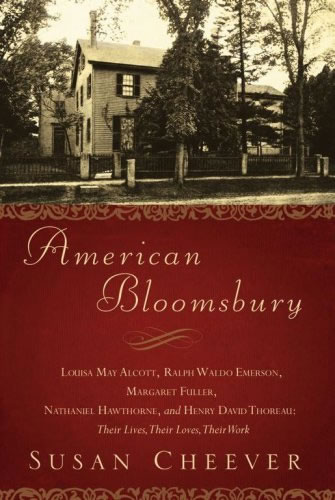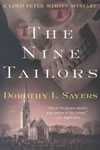A three-minute YouTube video on Women in Art uses morphing to intriguing and spectacular effect. Watch the eyes. Thanks, Robert Walsh.
It's been a watershed week, one of those times when lots of code just comes together. Driving to work in the morning, I work out the details of complex and surprising refactorings that clean up complex corners of Tinderbox code and open fascinating new vistas.
There aren't nearly enough hours in the day.
The ART closes out a strong season with a remarkable production of Pinter's No Man's Land. Four actors, each of them just about perfect.
The play runs through June 10; if you're in New England, it's worth a journey.
Duc N. Ly, who has a blog about Writing Diaries and Vietnam, writes an interesting review of Eastgate's watercolor sketchbooks.
I’ll be packing this slim book along on my sojourns. I love the indigo blue cover. It seems to be laced with fine fibers and wrapped in a soft paper over durable book making board.
I did some drawings with Uniball Vision fine. This pen, let me tell ya, bleeds on most surfaces, especially index cards. On the Savior Faire paper however, it wrote well and draws a fine line. In fact it’s a perfect pen for such a rough acid-free hand made paper
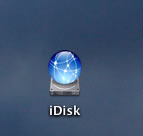
Continuing with the spring cleaning theme: you need a server.
Yep: you. A place to put files. Some for sharing, some just for safekeeping. A place far, far from home. A place with professionals who take care of the machines.
This weekend, I've been playing with really using my iDisk. It's an Apple-branded WebDAV server that's lightly baked into MacOS X, which means it's just there. Want to copy things to or from your iDisk? It's just like copying them to another folder. And it's fast: the computer keeps a local copy of everything on your disk, and sends stuff to the server in its spare time. It's about $100/year; I'm using right now to make sure I can see the book I'm working on from whichever machine I happen to be using. This weblog is sync'd, too.
Want web hosting? Pair has for a long time been a premium-service, premium price Web host. They've been one of our Web hosts for years. I have no complaints, and I'm a demanding customer. They just rolled out a new, beefy deal called PairLite, "perfect for hobby or project sites. With 50Gb/month of bandwidth and 2Gb of disk space (and 50 mailboxes), that's a hell of a hobby. $100/year or $30 for three months.
It's not a panacea, but it's nice to have a place out there to tuck files, just in case something goes sour with your machine, or just in case you need those files in some unexpected corner of the world.
Memorial Day cookout planning was complicated this year, because we had no idea until a few hours in advance just how many people were coming, and because the weather report was chancy up to fire-lighting time. Since lots of things I do on the grill aren't really worth cooking indoors, that meant lots of menu compromises.
This year, the theme was grazing: more (and smaller) courses to take advantage of different stages of the fire.
- apricots, stuffed with goat cheese and almond, wrapped in applewood-smoked bacon, and grilled over high heat
- hot Italian sausage dipped in mango-papaya chutney, fresh cilantro, and pecan chunks
- corn crepes brushed with hoisin sauce and filled with duck confit
- cedar planked salmon
- strawberry clafoutis
More spring cleaning: everyone needs a place to stash Web clippings. Back in the day, I needed one so badly that I wrote Web Squirrel. Right now, I use Yojimbo.

Yojimbo comes free with Tinderbox. Why not use Tinderbox directly? Because I'd need to decide what to do with the clipping, and that might lead me to start wondering if I should save it in the first place. Won't it just become clutter? Won't it be in the way?
As a result, I spend too much time looking for things I found yesterday, or the day before, or last week.
So, I just dump everything that might be worth saving into Yojimbo. It's not a public endorsement, like del.icio.us or ma.gnolia. If it turns out that I don't ever need the clipping, it doesn't really matter. But, if I do find myself looking for something, there's a big stack of stuff in Yojimbo and a fast search tool for finding the needles in my haystack.
Interesting Tinderbox email from Denmark's Dan Hirslund.
"Can software be emancipatory?
If the core to freedom is to be able to act upon the world - and thus to create or recreate it - then one of its tools is language. A package like Tinderbox, for instance, has created a new language for action (attributes, agents, adornments) that allows the user to develop new ideas and thoughts; to see relationships. Within its own language - that is restricted like all languages are - it opens up for creativity ('to write is to think').
"Write it down" is admittedly the first step but the software provides its own new language (tools) for aiding thought. Now, the critical question: Does the emancipatory potential within advanced software packages (Photoshop is another) primarily work as a safety valve for social repression - think of the gaming community - or does it also have a revolutionary function?"
Perhaps the gaming community is merely enjoying bread and circuses, but it seems to me that productivity tools must, in revolutionary times, be revolutionary. Of course, that only matters if the times are indeed right, and if the revolutionaries are willing to pick up the tools. But if workers of a former age were symbolized by hammer and sickle, surely workers today are symbolized by the cubicle and the laptop?
by Darothy L. Sayers
Busman’s Honeymoon is of the great mysteries of all time. Its first half is a masterpiece of charm and observation, filled with wonderful characters and a delightful romance.
Unfortunately, Sayers decided that she still needed a mystery to wind the spring of her plot, and at the end of a career of baroque mystery (this would be her last Lord Peter) she turned to one of her most baroque crimes. Chandler famously wrote that the criminal who schemed this one had to have God sitting in his lap, and of course he's right. And there are plenty of ugly snippets of borderline anti-Semitism, nasty class innuendo, and I think more than a dash of sexism in what is trying to be early pop feminism.
But still: Harriet, Peter, the people of Paggleham, and The Dowager Duchess.
(Amazon has this paired with Mystic River: what are they thinking? Two very good regional mysteries that share nothing else in common?)
Another amusing and handy little tool for your spring cleaning attention is FlySketch from the developers who call themselves, oddly enough, Flying Meat.

It's a screen capture program with some lightweight drawing tools. In other words, it's exactly what you need, when you want to explain something that's happening on your screen. Just pop up Flysketch, position its window over the interesting bit of the screen, a push the camera button: whatever was on the screen is now on your canvas. Grab the highlighter tool, circle the point of interest, and paste it all into email or Tinderbox. Just $24.95.

A nice little add-on for the Macintosh that works nicely with Tinderbox is Shades, It's a color picker; it supplements the color wheel and sliders that normally appear in your system color picker. Instead of asking you to choose one color, it shows you a color and a systematic set of variants.
I've been cleaning up my desk and my desktop, updating software and making sure everything runs well. This is one example of a nice little utility than can improve your virtual work space, quickly and easily.
It's free to try, and costs only $18.
Two new, and very different, essays were just announced by the Electronic Literature Organization. I've not always been a fan of ELO, but (obviously) I'm a big fan of terrific electronic literature. The new essays, it seems to me, say something important about the state of electronic literature.
It's too bad that this Important Thing is not what the writers thought they were discussing, but a tangential discussion is better than none.
Kate Hayles asks, "Electronic Literature, What is it?"
Hayles finds it to be quite a lot of things, and the essay proves a useful and modern survey of the gamut of electronic literature. Hayles is at her best when her vision is broadest, and in this survey her vision ranges all the way from classic hypertexts to codewerk and desktop cinema, from generative poetry to VR experiences.
Hayles' survey certainly confirms her assertion that "Electronic literature tests the boundaries of the literary and challenges us to re-think our assumptions of what literature can do and be." It's not a surprising or a bold assertion, but there it is. The essay is a useful piece of scholarship.
What Hayles seldom does, unfortunately, is allow herself much enjoyment of the work. Occasionally, she'll spare a sentence or two to describe and praise one among more than a hundred works she mentions. And Hayles herself is generally "blind to content" (a transgression for which she indicts Espen Aarseth's Cybertext). It's an essay about literature, after all, but we rarely hear of a character or an idea that does not concern a formal property of electronic literature itself.
The essay concludes with a summary of the "X-Literature Initiative", a pipe dream summons for all electronic writers to "migrate" to a common XML dialect they will all share and that will somehow be concocted to everyone's satisfaction at some later date. Hayles is right to say that "the scope" of this initiative "is breathtaking." Apparently she believes they are making progress. The last I heard of the project was in September 2004, when they estimated that they should be able to create an cross-platform interpreter for HyperCard within a year. How's that coming?
Joe Tabbi writes "Toward a Semantic Literary Web: Setting a Direction for the Electronic Literature Organization's Directory." Tabbi is a professor of English at Chicago Circle. He seems to support experimental writing, but his rhetoric is weirdly Republican.
Before reading this essay, I'd heard of Whig History, but I didn't know about Republican Lit Crit. This essay is cleverly presented as an academic working paper, but the attentive reader will find it filled with whimsy.
If experimental music and, later, improvisational jazz, lost their audience with the development of pop-oriented mass media, literary writing lost its audience a generation later, with the conglomeration of publishing in the Eighties and Nineties.
I read this and think to myself what a wonderful world of the fantastic Tabbi has created, a world where pop developed only a generation before the 80's. No Crosby, no Sinatra, no Jimmy Dean. No Opry! No Elvis! Back in the '60's, I guess they'd be listening to John Cage on their AM radios as they prepared to ship out for Da Nang, and "bubblegum" and "hair rock" would mean -- what? Moody Blues or Modern Jazz Quartet?
And in this new universe, the mass audience for literary writing survived the Great War! Compare this out our own world, where the best seller list for Memorial Day 1980 looked something like this:
- The Bourne Identity by Robert Ludlum
- Princess Daisy by Judith Krantz
- No Love Lost by Helen Van Slyke
- Random Winds by Belva Plain
- The Devil's Alternative by Frederick Forsyth
- Kane & Abel by Jeffrey Archer
- Portraits by Cynthia Freeman
- The Ninja by Eric van Lustbader
- The Bleeding Heart by Marilyn French
- Innocent Blood by P. D. James
Ah, those were the days when everybody read real literature, the time before publishing conglomerates spoiled it all.
But Tabbi, an inspired fantasy writer, is not satisfied merely by creating an alternate world, but also invents explanation to make that world cohere.
Both of these declines occurred with the rise of broadcast media, which by their nature reach a critical mass when content is homogenized and distributed from a centralized source
In our world, the publishing medium of the 1980's was not so very different from the medium of 1900 (when writers like Joyce had no trouble at all finding a publisher), and publishers in our world used to be notorious for haring after novelty and sensation at the expense of literary value. (In our world, the fact that a work reaches a vast audience implies the necessary consequence that lots of people experience it; you can't have a mass audience without this kind of homogeneity. Tabbi's nostalgia, then, seems to be for the good old days when only exceptional people (the gentry) read — perhaps 1814.)
Tabbi's concrete proposal calls for a database, or a wiki, or something — a big list, anyway. It is suppose to hold lots of electronic literature, or maybe pointers to electronic literature. It's meant to be annotated with lots of tags by lots of volunteers.
The ELO should be soliciting as wide a range of categories as possible, that all suggestions should be vetted, and that a mechanism is implemented for monitoring the frequency of keyword use by readers and editors alike. This way, Electronic Literature can aspire to an alternative to the age-old, vexed question of naming as a form of empowerment for some and disempowerment for others.
That age-old, vexed question of Adam's Power To Name (D20, hits on a 17 or above) is solved: all we have to do is vet and monitor, and nobody will be disempowered. (Well, nobody except the people who aren't vetting, but never mind them. This is Republican Lit Crit: the people who aren't vetting and whom we can't coopt aren't part of the base. To hell with them.)
In our case, readers need to be assured that what they are viewing is, in fact, regarded as literature by trusted and informed agents.
Oh, for a bright and shining land where you could trust those informed agents! The method (Kurtz: Do you think my methods are unsound?
) seems to be this: instead of asking a bunch of English Professors to review hypertexts and tell us which ones are literature and which not, we'll ask a bunch of English Professors.
Tabbi reads the opening to The Semantic Web Primer and discovers the queue, a concept in which he takes a special delight.
This layered approach might be reflected in a working arrangement where Directory submissions are sent to a que [sic] and picked up in a reasonable time, by a select group of responsible Board members (the reconstituted and expanded Working Group, if my suggestion is followed)....One needs a certain degree of faith, that a wide readership will adopt our terminology, but there are ways of providing a kernel that will get such adoption started.
There are ways.... In our mundane world, we introduce new critical nomenclature by using it, by showing how it illuminates our understanding and our enjoyment. In this fantasy, though, other methods are better. The key dream is that folksonomy is "after all" an emergent ontology. Folksonomies, in Tabbi's world, "are often put forth by their proponents as a critique of high-level, demagogic Semantic Web models." It's reassuring to know that, in Tabbi's universe, it's the high-level aristos who are demagogues, so we don't have to worry about those folks in the folksonomy! (Again, Republican Crit: those dangerous demagogues are probably from the democrat party.)
In Tabbi's world, alas, it appears we will no longer enjoy the company of English professors.
What critic would write a scholarly essay on The Unknown, when it is so much simpler to enter into the network, to attend the same conferences and hang out at the same parties attended by the authors, and be written about?
What critic would write a scholarly essay? In our quotidian world, Sam Johnson has a snappy answer: "No man but a blockhead ever wrote, except for money." It seems to me that critics get paid to write, and professors get paid to profess. So if you profess to love The Unknown, writing makes sense. (If you love going to conferences and hanging out at parties attended by the authors, that's another thing, isn't it?)
The institutional problem seems to present a personal concern:
The moment a professor or a writer stops regarding the computer as an enhanced typewriter, ceases to treat 'techies' as service personel [sic] uninterested in literature, and seriously seeks to locate literary concerns and create works in the new media environment, that potential e-lit author no longer enjoys the implicit support of a discipline. Authors working in electronic environments soon find themselves subject to stringencies of corporate and commercial enterprises that have their own, not always compatible, social structures and values set on knowledge production, description, and location.
This is quite wonderfully inventive! An English professor who is caught acknowledging an engineer or a scientist's interest in literature is, no doubt, turned out into the street, drummed out of the discipline. Perhaps, at the older universities, they ceremonially tread his tweeds underfoot as a warning to undergraduates.
What a world! I can't wait to read the next volume and to learn what happens to Hermione. And what about Naomi?
The US government wanted to start a television station in Iraq. They built a studio. They budgeted $63 million a year. They hired managers and staff and set up a Board of Governors to manage the managers. They started to broadcast. Naturally, the broadcasts were in Arabic.
None of the managers understood Arabic. None of the Governors understood Arabic.
And so, the US television has recently devoted hours to advocating terrorism, because nobody in management has any idea of what the people on the air were saying. State Department spokesmen repeat that management is doing "a very good job."
Why do things like this happen? I mean, it can't be very hard to staff a television station where some of the managers can watch the broadcast. You're in the State Department, you need to find someone to run an Arabic TV station for you. In all of the U.S., Great Britain, and Australia, surely you could find someone who is a real expert on Arabic entertainment. How hard could it be?
I met an Egyptian movie star at a dinner party in Somerville a couple of months back; there must be dozens of people you could ask. You could scour the film world, the television industry, academe. I bet there are university courses about Arabic TV. (Here's one at the American University of Cairo)
It's not rocket science and it's not an emergency. Can you staff a TV station without experts? Sure -- if you have to. In my dad's letters, there's a nice note home about how the young 1st Lt. Dr. Bernstein designed and built a shower house, somewhere in the Philippines. Did he have any knowledge of architecture, construction, plumbing? He did not. Is it sensible to have a surgeon design your showers? Yes: if you want to take a shower and your men want to take a shower and the architects and engineers and plumbers are all on some other island fighting some other war. In a pinch, sure: have the surgeon build the showers.
But we've been running this TV enterprise since 2004; surely they could have found staff by now?
The natural conclusion is that they wanted to "lose" the "war". Republicans do this all the time with other government projects: they appoint incompetents and grifters to run programs because then we'll all see what a bad idea those programs were. But this is Bush's War, and nobody believes more than Bush in the value of having your own TV network.
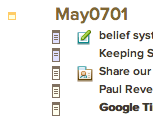
Another fresh Tinderbox experiment went out to the testers today. Here, we add badges — small icons — to notes in the map and outline view.
Each badge has a name. Agents and actions can easily set the badge for a note, so you can use badges to highlight especially significant or urgent notes, or simply to reflect what kind of note each item happens to be.
An interesting tension in supporting badges is that the vocabulary of badges needs to be sufficiently rich to express what you want to say (and to look as you'd like things to look), but not so vast that you can't find the badge you want to use. Another tension, inevitably, is the contest between symbolic and realistic drawing, and between big badges (which look better) and small ones (which are less disruptive).
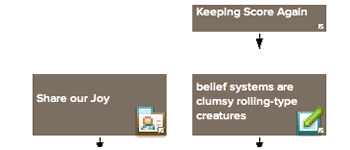
Via Mark Hurst, a very interesting visual poem, or game, or something, called game, game, game, and again game; or belief systems are small clumsy rolling-type creatures.
The author says the game's grunge aesthetic "repels the tyranny (cringe) of clean design and cold smoothness of much of the web/net art." Like the work itself, this gets more confusing the more you think about it. Clean design and cold smoothness are (sometimes) the style of corporate Web design, but grunge has always been close to the heart of netzkunst. And is the phrase, "much of the web/net art", an accident, an illiteracy, or a coded message? What's going on here?
And, ok, belief systems are clumsy rolling-type creatures. Are they? Something like 30% of U.S. adults strongly support the current administration. They think torturing suspects is fine. They think Iraq was a fine idea. A lot of them think evolution shouldn't be taught in school, but Christian prayer should. A lot of them want to lock up doctors who terminate pregnancies. What does the clumsy rolling-type creature tell us about this?
I think this is a limitation of the poetic language games we've seen in recent years: they're neat, but they don't really engage the world. Poetry wasn't always like that. It wasn't like that quite recently.
It little profits that an idle king,
By this still hearth, among these barren crags,
Match'd with an aged wife, I mete and dole
Unequal laws unto a savage race,
That hoard, and sleep, and feed, and know not me.
A couple of years ago, I talked briefly about baseball scorebooks — techniques for remembering what happens in a ball game. Just the other day, John Stephan dropped me a note to call my attention to Alex Reisner's wonderful gallery of scorecards, and especially his intriguing new method of Situational Scoring.
It's not quite a hypertext, but it's close and it's in the New Yorker and it's hilarious. Larry Doyle, Share Our Joy. Thanks, Diane Greco!
You will awaken at 2 A.M. (it’ll be too cold to sleep anyway) and llama it down Pachatata and then up Pachamama (Earth Mother). We should arrive at the peak between 4:30 and 5:30, depending on bandits....The Incas believe that if you stare into the sun as it rises on this day you will be Reawakened to the Ancient Knowledge of the Cosmos. Hopefully this will distract you from the sound of the seven llamas being slaughtered. (Some of you will have to walk back. Sorry.)
by David Hackett Fischer
To preserve operational security, the soldiers woke up and set off in the middle of the night. It was a large patrol. Insurgents had been increasingly active over the recent weeks.
Their mission: to locate explosives that the insurgency had hidden in houses and religious buildings in a farm town about 18 miles from the capital. Their goal: to support the shaky government by improving security, and perhaps to apprehend two notorious insurgent leaders.
Every effort was made to maintain secrecy, but of course the soldiers were observed by townspeople as they moved through the night-darkened streets and into the boats that the navy had supplied. Their equipment and uniforms made them conspicuous. The news passed from door to door. Someone climbed a tower and waved a pair of lanterns alert anyone watching on the other side of the river. People who saw the signal got word to the activists. Messengers set off to warn insurgent sympathizers: they are coming.
What I want to know is, how did we get from Revere to Baghdad? When did Americans decide to change sides? All this happened, pretty much, on my doorstep. Revere tried to get from Boston to Concord by the usual road, found it guarded, and so took the back way through the unfashionable towns of Malden and Medford. Malden, remaining unfashionable, is where I live; my daily commute takes me down the road Revere road toward Mass. Ave., where Revere turned right toward Lexington and I go straight on to Watertown.
David Hackett Fischer's history of the dawn of the American insurgency is brilliant, lively, and intelligent. The research is immaculate, the historiography brilliant, and Fischer's judgments unclouded by legend, hagiography, or academic timidity.
Via Robert Brook, Google generates a fairly interesting timeline for hypertext. This is the consensus wisdom, I suppose; it's wrong, but it's what you usually read. The corresponding map view on the other hand, is random noise. An excessively brief page summarizes of the experiment.
by David Weinberger
InEverything is Miscellaneous
, David Weinberger writes (p. 145) that
One of the lessons of Wikipedia is that conversation improves expertise by exposing weaknesses, introducing new viewpoints, and pushing ideas into accessible form.
Is this true?
We might also ask whether this is a lesson of Wikipedia. It seems to me, really, that this is a lesson of Socrates; indeed, unlike lots of lessons we attribute to Socrates but that are really only attributable to Plato, this one probably really is Socrates. The tradition of dispute and debate as a route to knowledge is honored in the Norwegian doctoral examination, where candidates still face an opponent in their final exercise. These have better claims to be conversations than does Wikipedia.
It is entirely possible for a group of people to sit down, think about a problem, discuss it, and come to a conclusion that is, quite simply, wrong. Juries are wrong all the time; lots of people are convicted and are subsequently exonerated. Students are wrong, too. Imagine: six students are work together on a tough calculus problem and work out a solution that's simply specious. If you're a math teacher, is this extraordinarily surprising? Of course not. Lots of people conversed about Galileo's books, reaching the wrong conclusion. Lots of people discussed the advisability of Pickett's Charge, Herbert Hoover's deflationary monetary policy in the wake of the 1929 crash, and the production budget for Heaven's Gate.
Lots of people in 1950 thought the US State Department was heavily infiltrated by Communists. In 1955, lots of people (including the Prime Minister) discussed Kim Philby and concluded that "he carried out his duties ably and conscientiously."
Millions of people thought George H. W. Bush would make a good president. Some of those people, I'm told, discussed the matter. We know how well that worked.
It's perfectly possible to discuss a question and arrive at the wrong answer. Conversation can improve expertise but it can also degrade expertise by mixing it with inexpert opinion.
by Philip K. Dick
This 1962 alternate history explores a world in which Germany conquered Europe and Japan successfully carved out a co-prosperity sphere throughout the Pacific rim, including the North American coast. In a clever conceit, Dick's characters themselves are reading an alternate history that describes yet another outcome of the war, and several come to conclude that their own reality is but a dream.
The core topic, I think, is the American occupation of Japan and its consequences, both for the US and for Japan. We see the contrast of imperial swagger and sincere appreciation for artistic and folk traditions, and we experience at first hand (but with roles reversed) the subtle argumentation of art and mass production, the debasement of the oppressed by the temptations of mass production and the quick buck. And we see strategies for resistance, ranging from subverting the market for "authentic" antiquities to creation of new, ideologically charged, indigenous art forms.
A strange omission, it seems to me, is any mention of the Japanese Detention Camps. Surely, these camps would have become a cause célèbre in the Japanese occupation of California, and the Survivors would have been very much on the minds of the Japanese administration and of the oppressed native Americans.
A long, stirring and well-deserved tribute by Digby co-blogger tristero to Brady Kiesling, author of Diplomacy Lessons:realism for an unloved superpower
.
Heroes are always a rare thing. But one of the greatest of our time surely is John Brady Kiesling, the career diplomat in Greece who dramatically resigned in 2003 rather than continue to support the Bush/Iraq war.
On occasion, both digby and tristero let loose with a brilliant essay on the American political climate. This is one of them. Tristero's central point is that something very real has changed in our political life.
Given both his pragmatic approach to diplomacy and the overall tenor of his writing, Kiesling is the kind of person who, at one point, would probably have been labelled a conservative. Quiet, principled, uninterested in revolutionary change, loyal to his country, aware of America's foibles, but never seriously questioning its core ideas. I used to meet people like him, registered Republicans, people who I strongly disagreed with on many, many issues but whose basic decency and integrity was simply beyond question. That was a very long time ago.
Anja Rau's Konzeptionerd has a substantial study of Community Sites and an intriguing personal note on “Why I cannot seem to twitter."
If I could twitter at a conference, I probably have my computer with me. And when I have my computer with me, I have my Tinderbox. And Tinderbox is simply the superior (conference) notetaking tool.
by Susan Cheever
A deeply silly book, written by a very talented and engaging writer. I loved her Notes Found In a Bottle, and this volume sets out to tell the intertwined stories of five important writers whose lives intersected in 19th century Concord.
It was a fascinating time and these are fascinating people, but Cheever is so enthralled by their various loves that she can spare little attention for their ideas. These people still fascinate us because they were so deeply engaged with ideas; they lived in the mind more than the flesh, though their ideas were always firmly rooted in the nobility of labor, the fruitful soil, and the transience of this world. It is interesting to know that they likely fell in and out of bed with each other from time to time, but to ignore the ideas and the work for the love story is, I think, to miss the point.
Perhaps this is not the book Cheever wanted to write. Cheever's treatment of Thoreau, Hawthorne, and especially of Emerson is superficial, but she seems a great deal more interested in Louisa May Alcott, in Lydian Emerson, and (to a lesser degree) in Sophia Peabody. Perhaps their biography turned out to be impossible to recover or impractical to market. The absence of ideas makes more sense if the book was meant to be centered on the practical, retiring Lydian and the invalid Sophia, especially when contrasted with Louisa May Alcott.
When Cheever does get around to discussing ideas, her focus is bizarre. She revels in deploring Bronson Alcott's willingness to accept other people's money and Emerson's reliance on his wife's subservience, but who relies on Mr. Alcott for ideas about earning a living, or on Emerson for feminism? She observes that Thoreau's influence lay far in the future, that to the Concordians he was at best a minor writer who was useful to have around the garden, yet she engages Walden in more detail than any book of Emerson's. Her condemnation of the Transcendentalist for their intolerance of slavery is bizarre, as she seems to imagine that the war was caused by a few ideological hotheads and that, left in more politic and tolerant hands, a continuing compromise could have been achieved or that New England in 1860 would have been happy to support slavery indefinitely. Had New England been so compliant some four score years earlier, there would have been no revolution and American literature would have been, at most, a provincial fashion.
Helvetica, designed by Max Miedlinger and Eduard Hoffman for Haas Type Foundry, is fifty years old.
It recently came to my attention that NetNewsWire treats relative URLs in RSS feeds one way if you have syncing on, and another way entirely if you turn it off.
Ouch. Bottom line: you really want to avoid relative URLs in RSS feeds.
OK. The problem is, some of my Tinderbox projects want relative URLs on my HTML pages, because they're shorter and they're much easier to test. With relative URLs I don't need to upload the page to see if the images are right. So, I want relative urls in the HTML but absolute urls in the RSS version of the same post.
Ouch.
So here's what I'm trying. The export element ^root continues to export a relative path, unless you tell it otherwise. But, whenever you like, you can say
^setRoot(http//example.com/myDirectory/)
and, for the rest of the current page, Tinderbox will assume that ^root is actually the URL you specify.
Comments? Email me. It seems awfully complicated to me, but I don't see an easier way to fix this in Tinderbox. It really should be fixable in RSS: NNW could choose an interpretation, say "here is what we do", and there we'd be.
Queenie was sexually ambitious.
So:
Now you know:
A fascinating woman, as they go.
The New Repertory has a worthwhile production of Andrew Lippa's musical, “The Wild Party”, based on the wonderful book-length poem by Joseph Moncure March.
The musical is, at once, ambitious and strangely unambitious. It's (nearly) through-sung, and it bounces in interesting ways among musical styles. Lippa tries as well to wrest a fresh plot from March's story and to repair some of the seamy blunders of March's 1920s sensibilities. The plot repairs work reasonably and are less drastic than Adam Guettel’s The Light In The Piazza , in which a central fact that the short story discloses right at the start is withheld in the play to create a tightly-wound narrative spring.
But, if you're a composer and you’re interested in The Wild Party, I'd think you'd be interested in the March's strangely syncopated meter. Lippa really doesn't seem to be, and as the night progresses he seems to lose interest in the poem. And where does this lead? March knew:
The door sprang open
and the cops rushed in.
The musical wanders somewhere else.
by Dorothy R. Sayers
Perhaps the definitive early mystery, this is a delight I save for special occasions, usually for a return from a nice old corner of England. Sayers understands what she needs to explain and what she can leave unsaid, and respects the reader enough to let us puzzle out the mysteries of change ringing. without buckets of unnecessary exposition. The imperfections — the nasty anti-semitic slur, the over-the-top elaboration of plot — are characteristic of Sayers but don't detract from the book’s special delights and, as ever in Sayers, the minor characters are delicious.
At a banquet at Royal Holloway, I confessed to my English dining companion that everything I knew about British women's education I learned from Dorothy Sayers. He looked blank. Don’t let this happen to you. If you haven’t met Sayers, start here.
David Newton's extraordinary school project takes a tracking shot of the Bayeaux Tapestry and adds a little bit of animation and appropriated soundtrack. Wow. Thanks, Eric!
Observe how many ways this could have gone wrong and turned into a completely tasteless or juvenile exercise. And notice, too, that Newton carries through. Often, school projects start with elaborate care but peter out as deadlines loom or as the work becomes work.
Jill has been live-blogging superbly from the so-called "future of electronic literature" conference, where (if I understand correctly) Kate Hayles has been advancing her argument for literary studies to embrace "artworks that interrogates the contexts, histories, and productions of literature" even though the message is not really carried in words.
There I was at lunch, floating down the Amazon, having an amazing lunch with a bunch of people I didn't know and would be spending a lot of time with. We were talking about books -- Freakonomics won high praise -- and logistics. Since most of these people live on a ship, they depend on Amazon even more than I do, and they're just as eager for answers to that critical question, "What should I read next?"

In a lull, I mentioned that I'd love to read a biography or a good essay about Gertrude Bell, the woman who pretty much invented Iraq. "Oh yes!", said the young Englishwoman (who was actually from Australia: Americans are hopeless), in a very brief interval of animation. But it proved impossible to draw her out, even though in my book a hull is an introduction even if you're not an American who doesn't know any better.
So, what do I find this morning in The Atlantic Monthly this morning, but a review of a new biography of Gertrude Bell! Christopher Hitchens is enthusiastic for Georgina Howell's new biography
. There's also a new biography by Liora Lukitz
.
Now, how to choose?
Hugh Nicoll is blogging again (hooray!) and points to an interesting reading test by Geof Huth — an ideogram that is (apparently) also a visual "poem". I haven't been able to read it yet.
You won't have any trouble reading David Brook's Druid Street, a design inspired by The 100% Easy-To-Read Standard. See also Matt Haughey's new Fortuito.us .
Birthday Greetings to Dave Winer, whose Scripting News continues to be a superb example of the best tech journalism and commentary.
by Steven D. Leavitt and Stephen J. Dubner
A witty book that makes lots of clever observations about social issues by applying the rigor of economics and an open mind to a variety of intriguing questions. If drugs are such a terrific business, why are so many drug pushers impoverished? How might Roe v. Wade have affected crime rates? What can we learn by studying the names people choose for their babies? The common thread here is to gather observational data in statistically useful samples and then to study that data creatively and dispassionately.
Text lists that sit, tediously, on the screen are the bane of PowerPoint presentations everywhere. Tom Battino mentions his FOO Camp presentation on Japanese kamishibai storytelling, in which storytellers use a stack of prepared images to carry the visual thread of the story they're telling. (wikipedia) (teachers' guide and history)
Of course, kamishibai are simply a very low-tech, ultra-reliable form of PowerPoint. The convention that you keep the text off the story cards is instructive, though; your slides don't need to explain themselves. You're right there. You can explain them.
On Sunday, I ran to the store for some milk and stumbled across a 4lb veal breast at $1.29/lb., with $2 off because today was its sell-by date. I made a batch of veal stock, and now I'm looking for tasty ways to use it.
For starters, I thought I'd try some pork tenderloin, wrapped in bacon, seared, finished in the oven and served with sauce Robert. I blew it: the tenderloin was a little bland and I didn't have quite enough white wine for the sauce, and I think I also skimped on the mustard. So, very edible but not stellar.
There were leftovers, though, and so I sliced some of the pork this morning for a sandwich. I also grabbed some jalapeno jack cheese, left over from a quick queso fundido experiment. And you know, that adequate entrée makes a great sandwich.
There's an interesting battle over at Digg, a social bookmarking service. Someone figured out the encryption key for HD-DVD disks and posted it on their web site. Someone else in the industry said "that's our secret: take it down!" So they did. The code spread, and more cease and desist orders flowed.
That was yesterday.
Needless to say, some people bookmarked the controversial sites with the code, and so the code showed up at Digg, and Digg got a cease-and-desist order too. And so they'd delete the bookmarks, and users would make MORE bookmarks, and there was a full-scale donnybrook. Eventually, Digg reversed field:
But now, after seeing hundreds of stories and reading thousands of comments, you’ve made it clear. You’d rather see Digg go down fighting than bow down to a bigger company. We hear you, and effective immediately we won’t delete stories or comments containing the code and will deal with whatever the consequences might be.
If we lose, then what the hell, at least we died trying.
